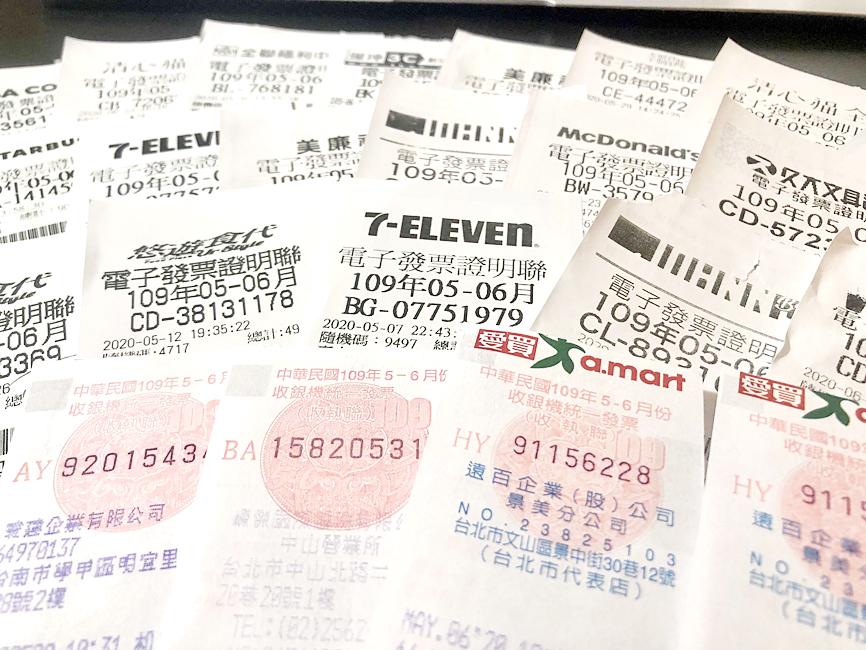The winning number for the NT$10 million (US$347,029) special prize in the September-to-October uniform invoice lottery is 42024723, the Ministry of Finance said yesterday.
The winning number for the NT$2 million grand prize is 64157858, while three numbers qualify for the first prize of NT$200,000: 68550826, 84643124 and 46665810.
Invoice holders that match the last seven digits of the first-prize numbers would win NT$40,000 and those with invoices that match the last six digits would win NT$10,000.

Photo: CNA
Other prizes are NT$4,000 for invoices with the last five digits of the first-prize numbers, NT$1,000 for invoices with the last four digits and NT$200 for invoices with the last three digits.
An additional NT$200 prize would go to holders of invoices ending in 651 or 341.
The prizes can be claimed between Dec. 6 and March. 5, the ministry said upon announcing the winning numbers.
Prizes of NT$1,000 or less can be redeemed at 7-Eleven, FamilyMart, OK Mart, Hi-Life, Pxmart and Simple Mart stores.
For prizes up to NT$40,000, invoices can be redeemed at credit cooperatives across the nation, while First Commercial Bank (第一銀行), Chang Hwa Bank (彰化銀行) and the Agricultural Bank of Taiwan (農業金庫) offer cash redemptions for all prizes, including those larger than NT$200,000.
The uniform invoice lottery system, which draws winning numbers every two months, aims to encourage people to collect their invoices to prevent tax evasion by retailers.

Quanta Computer Inc (廣達) chairman Barry Lam (林百里) is expected to share his views about the artificial intelligence (AI) industry’s prospects during his speech at the company’s 37th anniversary ceremony, as AI servers have become a new growth engine for the equipment manufacturing service provider. Lam’s speech is much anticipated, as Quanta has risen as one of the world’s major AI server suppliers. The company reported a 30 percent year-on-year growth in consolidated revenue to NT$1.41 trillion (US$43.35 billion) last year, thanks to fast-growing demand for servers, especially those with AI capabilities. The company told investors in November last year that

Intel Corp has named Tasha Chuang (莊蓓瑜) to lead Intel Taiwan in a bid to reinforce relations between the company and its Taiwanese partners. The appointment of Chuang as general manager for Intel Taiwan takes effect on Thursday, the firm said in a statement yesterday. Chuang is to lead her team in Taiwan to pursue product development and sales growth in an effort to reinforce the company’s ties with its partners and clients, Intel said. Chuang was previously in charge of managing Intel’s ties with leading Taiwanese PC brand Asustek Computer Inc (華碩), which included helping Asustek strengthen its global businesses, the company

Taiwanese suppliers to Taiwan Semiconductor Manufacturing Co. (TSMC, 台積電) are expected to follow the contract chipmaker’s step to invest in the US, but their relocation may be seven to eight years away, Minister of Economic Affairs J.W. Kuo (郭智輝) said yesterday. When asked by opposition Chinese Nationalist Party (KMT) Legislator Niu Hsu-ting (牛煦庭) in the legislature about growing concerns that TSMC’s huge investments in the US will prompt its suppliers to follow suit, Kuo said based on the chipmaker’s current limited production volume, it is unlikely to lead its supply chain to go there for now. “Unless TSMC completes its planned six

TikTok abounds with viral videos accusing prestigious brands of secretly manufacturing luxury goods in China so they can be sold at cut prices. However, while these “revelations” are spurious, behind them lurks a well-oiled machine for selling counterfeit goods that is making the most of the confusion surrounding trade tariffs. Chinese content creators who portray themselves as workers or subcontractors in the luxury goods business claim that Beijing has lifted confidentiality clauses on local subcontractors as a way to respond to the huge hike in customs duties imposed on China by US President Donald Trump. They say this Chinese decision, of which Agence